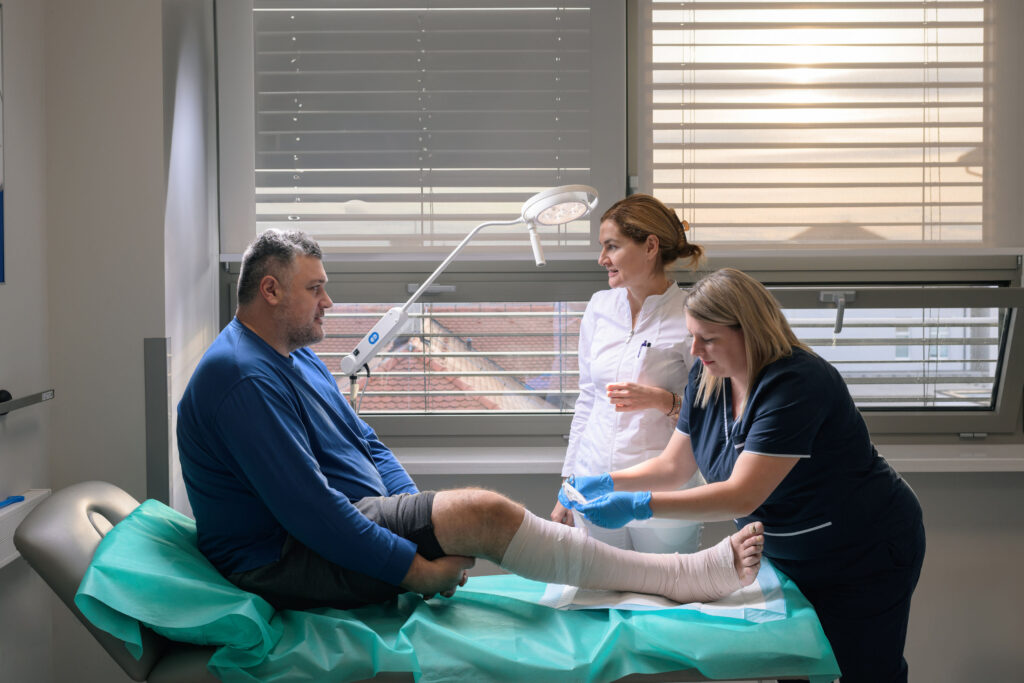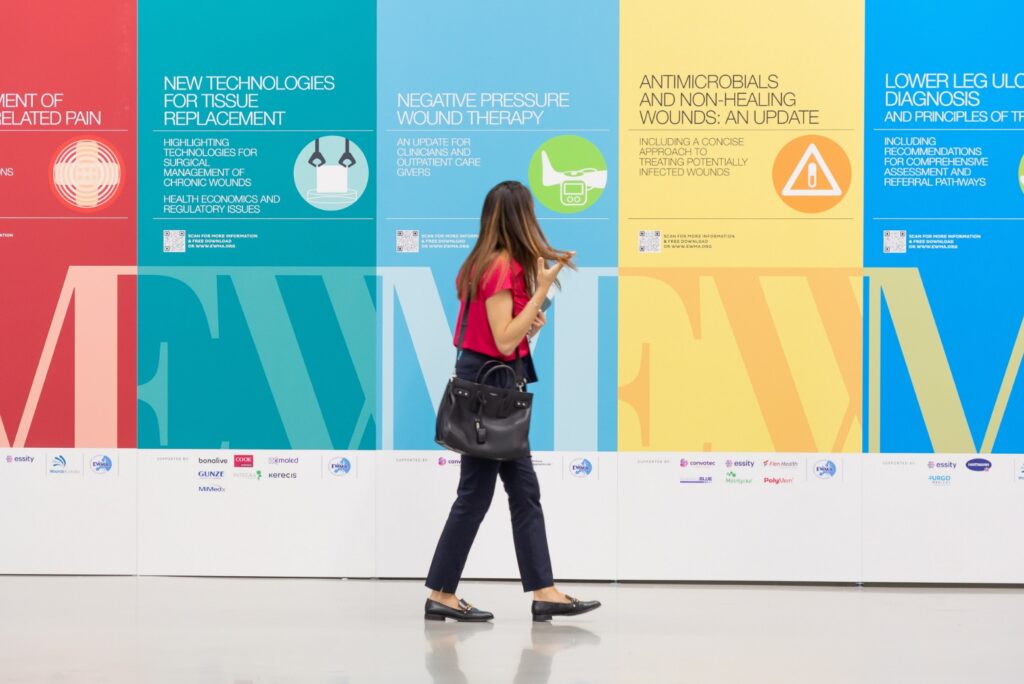Resources for patients and private carers
Find practical information and guidance for individuals with non-healing wounds and/or private care givers.
Remember to direct any specific questions or concerns regarding your personal wound management journey directly to your healthcare provider. EWMA is not able to provide advice concerning specific cases.
Wound Q&A for patients and relatives
A holistic approach to wound care is important to ensure appropriate treatment and management is provided. Therefore, it is recommended that you inform your General Practitioner (GP) and/or wound care nurse about other issues related to your health status (other chronic diseases, medication, etc.) and ask questions about your wound. These questions can lead to a valuable dialogue with your clinician to help your wound to heal. Working with your clinician and the treatment plan helps to ensure that potential complications are minimised.

Living with chronic wounds
Living With Chronic Wounds (LWCW) is a EWMA project that aims to illustrate the experience of wound patients in a number of recorded interviews with patients, and healthcare professionals responsible for the treatment and care of the patient, as well as a representative of the healthcare institution. The most common types of non-healing wounds are represented, among others diabetic foot ulcers, pressure ulcers and venous leg ulcers.
The videos were created by filmmaker Aurora Piaggesi. Copyright © EWMA 2018. The videos are available for use in education, advocacy activities and various communication activities.
Countries & videos
Czech Republic | Venous Leg Ulcer
Finland | Pyoderma gangrenosum
France | Pressure ulcer
Italy | Diabetic Foot
Switzerland | Venous Leg Ulcers
United Kingdom | Lymphoedema
United Kingdom | Recessive dystrophic EB (RDEB)
Videos
Patient rights
The European Charter of Patients’ Rights (Article 35 of the Charter of Fundamental Rights of the European Union) states 14 patients’ rights that together aim to guarantee a ‘high level of human health protection’ and to assure the high quality of services provided by the various National Health Services in Europe.
The 14 rights are an expression of fundamental rights and as such they must be recognised and respected in every country. They are correlated with duties and responsibilities that both citizens and healthcare stakeholders have to assume. This charter was drafted in 2002 by Active Citizenship Network.
The European Wound Management Association supports the European Charter of Patients’ Rights and Article 35 of the charter of Fundamental Rights of the European Union. This charter can reinforce the degree of protection of patients/citizens rights in the different national contexts and can be a tool for the harmonization of national health systems that favours citizens and patients rights.
The 14 rights are linked to other international documents and declarations, emanating in particular from the World Health organization (WHO) and the Council of Europe.
- Right to Preventive Measures – Every individual has the right to a proper service in order to prevent illness.
- Right of Access – Every individual has the right of access to the health services that his or her health needs require.
- Right to Information – Every individual has the right to access to all kind of information regarding their state of health, the health services and how to use them, and all that scientific research and technological innovation makes available.
- Right to Consent – Every individual has the right of access to all information that might enable him or her to actively participate in the decisions regarding his or her health; this information is a prerequisite for any procedure and treatment, including the participation in scientific research.
- Right to Free Choice – Each individual has the right to freely choose from among different treatment procedures and providers on the basis of adequate information.
- Right to Privacy and Confidentiality – Every individual has the right to the confidentiality of personal information, including information regarding his or her state of health and potential diagnostic or therapeutic procedures, as well as the protection of his or her privacy during the performance of diagnostic exams, specialist visits, and medical/surgical treatments in general.
- Right to Respect of Patients’ Time – Each individual has the right to receive necessary treatment within a swift and predetermined period of time. This right applies at each phase of the treatment.
- Right to the Observance of Quality Standards – Each individual has the right of access to high quality health services on the basis of the
specification and observance of precise standards. - Right to Safety – Each individual has the right to be free from harm caused by the poor functioning of health services, medical malpractice and errors, and the right of access to health services and treatments that meet high safety standards.
- Right to Innovation – Each individual has the right of access to innovative procedures, including diagnostic procedures, according to international standards and independently of economic or financial considerations.
- Right to Avoid Unnecessary Suffering and Pain – Each individual has the right to avoid as much suffering and pain as possible, in each phase of his or her illness.
- Right to Personalized Treatment – Each individual has the right to diagnostic or therapeutic programmes tailored as much as possible to his or her personal needs.
- Right to Complain – Each individual has the right to complain whenever he or she has suffered a harm and the right to receive a response or other feedback.
- Right to Compensation –
Each individual has the right to receive sufficient compensation within a reasonably short time whenever he or she has suffered physical or moral and psychological harm caused by a health service treatment.
Patient rights
The European Charter of Patients’ Rights (Article 35 of the Charter of Fundamental Rights of the European Union) states 14 patients’ rights that together aim to guarantee a ‘high level of human health protection’ and to assure the high quality of services provided by the various National Health Services in Europe.
The 14 rights are an expression of fundamental rights and as such they must be recognised and respected in every country. They are correlated with duties and responsibilities that both citizens and healthcare stakeholders have to assume. This charter was drafted in 2002 by Active Citizenship Network.
The European Wound Management Association supports the European Charter of Patients’ Rights and Article 35 of the charter of Fundamental Rights of the European Union. This charter can reinforce the degree of protection of patients/citizens rights in the different national contexts and can be a tool for the harmonization of national health systems that favours citizens and patients rights.
The 14 rights are linked to other international documents and declarations, emanating in particular from the World Health organization (WHO) and the Council of Europe.
- Right to Preventive Measures – Every individual has the right to a proper service in order to prevent illness.
- Right of Access – Every individual has the right of access to the health services that his or her health needs require.
- Right to Information – Every individual has the right to access to all kind of information regarding their state of health, the health services and how to use them, and all that scientific research and technological innovation makes available.
- Right to Consent – Every individual has the right of access to all information that might enable him or her to actively participate in the decisions regarding his or her health; this information is a prerequisite for any procedure and treatment, including the participation in scientific research.
- Right to Free Choice – Each individual has the right to freely choose from among different treatment procedures and providers on the basis of adequate information.
- Right to Privacy and Confidentiality – Every individual has the right to the confidentiality of personal information, including information regarding his or her state of health and potential diagnostic or therapeutic procedures, as well as the protection of his or her privacy during the performance of diagnostic exams, specialist visits, and medical/surgical treatments in general.
- Right to Respect of Patients’ Time – Each individual has the right to receive necessary treatment within a swift and predetermined period of time. This right applies at each phase of the treatment.
- Right to the Observance of Quality Standards – Each individual has the right of access to high quality health services on the basis of the
specification and observance of precise standards. - Right to Safety – Each individual has the right to be free from harm caused by the poor functioning of health services, medical malpractice and errors, and the right of access to health services and treatments that meet high safety standards.
- Right to Innovation – Each individual has the right of access to innovative procedures, including diagnostic procedures, according to international standards and independently of economic or financial considerations.
- Right to Avoid Unnecessary Suffering and Pain – Each individual has the right to avoid as much suffering and pain as possible, in each phase of his or her illness.
- Right to Personalized Treatment – Each individual has the right to diagnostic or therapeutic programmes tailored as much as possible to his or her personal needs.
- Right to Complain – Each individual has the right to complain whenever he or she has suffered a harm and the right to receive a response or other feedback.
- Right to Compensation –
Each individual has the right to receive sufficient compensation within a reasonably short time whenever he or she has suffered physical or moral and psychological harm caused by a health service treatment.
The EWMA Home Care - Wound Care project
A EWMA working group is currenlty workin on a Tool Kit including evidence-based and/or best practice-based resources specifically designed for patients and private care givers or primary care staff who provide wound care in the patient’s home.
The project will include guidance on the role of the patient and/or family caregivers in the wound management team.
The tool kit is expected to be available in Autumn 2025.


